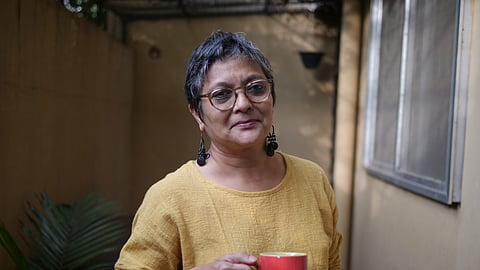

BENGALURU: ...unsung songs quiver and quake in soil and sludge shattered dreams buried wishes flayed bodies.
(lines from Song Slaughter by Mamta Sagar)
Raw emotions. Unfiltered truths. These are the key features of critically-acclaimed Kannada poet Mamta
Sagar’s poetry. For Sagar, who was recently conferred with the World Literary Prize for her contributions to the world of literature by the World Organisation of Writers (WOW), poetry is her tool to resist oppression. The organisation is known to encourage writers in the achievement of global peace and serves as a platform for writers to address international conflicts. “I received an email saying that 10 writers from all over the world are being invited to apply for the award but when I read the criteria, it said, ‘You should have three international reviews’. So I wrote to them saying that I’m a writer who writes only in Kannada as a principle and political stance and I told them I won’t be able to apply,” recalls Sagar. The committee got back to her saying that just interviews instead of international reviews will suffice for the application.
Sagar’s commitment to language as a cultural bastion was palpable as she addressed the audience in Nigeria. She advocated for the preservation of linguistic diversity, emphasising the role of language in maintaining cultural identity. “It is important to not let go of your languages, because that holds to music, culture and sounds of our roots,” says the 58-year-old poet, who never imagined she would actually get the award. “I’m really proud that my name in history went with Wole Soyinka, the Nigerian nobel laureate and political activist who was also given an award. And I am truly glad that I got this award in Nigeria as opposed to any other European country,” reflects Sagar.
Her work as a translator further underscores her commitment to cultural dialogue. “I believe that translation is not a repeat of an original but a new work altogether,” she explains. Her translations span continents, bringing Latin American and European sentiments into the Indian context along with being one of the first poets in the country to get the Charles Wallace fellowship for translating 100 resistance poems from all over the world into Kannada.
Speaking about her process, she says, “I do collaborative work where I’ll ask the poet to present the poem and listen to the musicality of the language, meanings of the language, the historical and socio-political context of whatever the poem is trying to say and try to bring that into Kannada,” says Sagar.
Along with her translation work, Sagar particularly engages in performance poetry which involves collaborating with other artistes and mediums. “I don’t just write poems. I work with musicians and visual artistes. The musicality that is embedded in the Kannada language is the strength of my poems,” highlights Sagar, who is the founder of community-oriented poetry group, Kavya Sanje, which has become a platform for diverse voices.
The poet uses her craft to challenge societal norms. “Writing itself is a political stance. If you are a writer, whoever you might be, realising your privileged identity is extremely important,” she says, further adding, “Kannada literature itself is resistance literature.
All classics of Kannada like Mahabharata and Ramayana are a kind of resistance to the Sanskritised version of the epics. All the heroes and villains in Valmiki and Vyas’s versions take a different turn: villains become heroes, heroes become villains; contesting this whole notion of Aryan identity. My practice is part of that long culture in history,” she says.